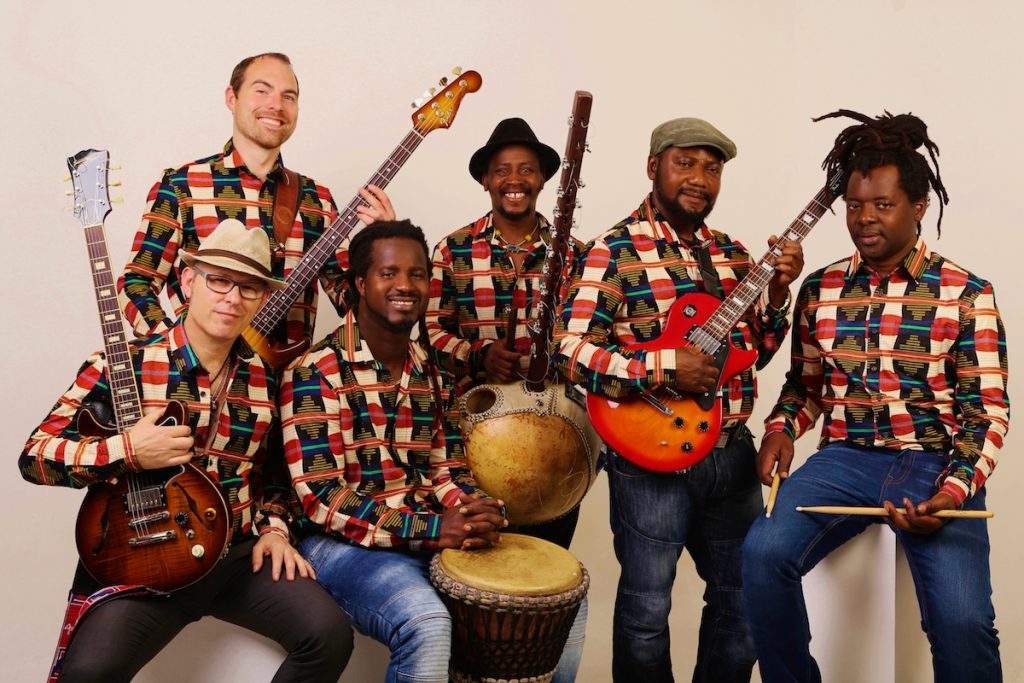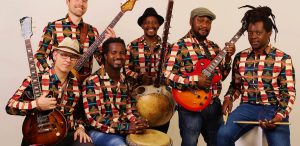Fifty years ago, The Beatles were in the throes of recording Abbey Road. Overcoming the tension that lingered from their ill-fated Let It Be sessions, the fab four produced an album befitting of a group with their musical reputation: enduring songs, elegant production and a now iconic cover photo, all helping the LP to top charts internationally. While it doesn’t have a concept as immersive as that underpinning Sgt. Pepper’s Lonely Hearts Club Band, or exhibit the degree of experimentation that made the ‘White Album’ such a varied artistic triumph, it does capture the band writing, playing and singing at their best: recognising that their journey as a group was reaching its conclusion, and turning in a record that would ensure their legacy endured for many years to come.
Material from Abbey Road will be a vital part of London Astrobeat Orchestra’s set when the six-piece band return to Band on the Wall in September. As they did with songs from Talking Heads’ Stop Making Sense last year, they’ll be uncovering and highlighting musical elements descended from West African musical traditions, rearranging and presenting the well known songs with mellifluous kora lines and an infectious West African pulse, resulting in a highly danceable take on The Beatles’ time-honoured work.
Discussing the task ahead of them, bassist and bandleader Edd Bateman explains: ‘On the surface, the links between what we do and The Beatles may seem tenuous. Actually, when you get down to it, the influences are all around.’ A musician who has played with some of the great Senegalese, Malian and Gambian musicians, learning from years of experience and extensive travel, he is able to appreciate the African roots of the rock ‘n’ roll style that gave the Beatles their early impetus, as well as recognise how the music they created in turn made an impact in Africa.
‘Many people don’t realise where some of the instruments we take for granted and see every day actually come from,’ he states. ‘Where does Paul’s Höfner bass descend from? Electric bass came from double bass, which is in the string family; basically a giant violin. What we know as the violin was standardised around the 16th century, but if you go to West Africa today, you can still see plenty of instruments like riti and goje, which are one or two-string violins: unchanged ancestors of our orchestral instruments.’ Discussing the artists that inspired The Beatles, Edd draws connections back to West African music.
‘It interests me how and why different genres evolved. The Beatles got their influences from American rock ‘n’ roll artists like Elvis Presley and Chuck Berry, but who influenced them? It was the early blues pioneers in the Deep South. Where did their style come from? West Africa. Different demographics of Africans arrived at the main American ports in Louisiana, South Carolina and Virginia, and the majority ethnic group in Louisiana were the Malian Bambara tribe. The New Orleans port was an entry point for Mississippi, so it’s not surprising to hear connections between the blues developed there and the current music of Mali. I’d like to know why blues and Malian music focus on a different mode of the same pentatonic scale: for example blues may use E, G, A, B, D centered around the E, but Mali would centre around the A, maybe that’s to do with the Scots Irish folk songs and tunings also entering the Southern states but that’s a story for another time. Without the Malian ancestral blues hereditists, The Beatles would have sounded very different and who knows what would have come since.’
With their understanding of musical styles, Bateman and the band are able to tease strains of West African influence out of the music they cover, emphasising its presence with new arrangements and instrumentation. Edd introduces the band members who help bring their West African sound to life:
‘King Fire is a Congolese guitarist I’ve worked with for the last ten years. In our early days, with the various projects we had, it was more of a struggle to reach the kind of audiences that we do now, but we just focused on what we knew best: playing long, full on Soukous concerts until the audience could no longer stand. If you want to know why he’s called King Fire, just come to the show and you’ll see.
I know most of the Griot kora players in this country and specifically wanted to work with Mosi Conde because he really doesn’t hold back. He’s mental. The kora is a diatonic instrument so songs with big key changes won’t work, but that doesn’t matter to him, for those songs he just drops his Kora, picks up his cowbell and launches himself into the crowd to fire up the dancefloor. Imagine if Bez was from Guinea, wore a hat and could play every West African traditional instrument to a world class standard. That would be our Mosi Conde.
I met our drummer Badou Ndiaye onstage at a kora festival when a few of us were called in to jam a finale song. We ran into each other a few years later in Dakar, Senegal, when he was playing with Cheikh Lo, and when I heard he was back in the UK, it was perfect timing for getting this band together. There are a few wild characters in the band and Badou just kind of calmly glues everyone together and makes it all happen.
Julian Burdock is a real blues-rock guitar hero that I’d met once at an audition. The combination of his distorted guitar force mixed with King Fire’s intricate Sebene lines are an important part of our sound.’
London Astrobeat Orchestra play music from Abbey Road and other Beatles classics at Band on the Wall on 19th September.



